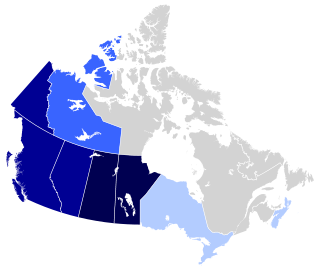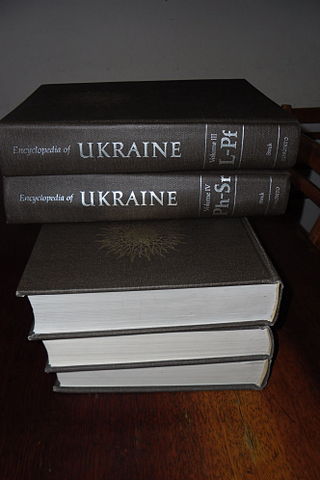
Alberta is one of the thirteen provinces and territories of Canada. It is part of Western Canada and is one of the three prairie provinces. Alberta is bordered by British Columbia to the west, Saskatchewan to the east, the Northwest Territories (NWT) to the north, and the U.S. state of Montana to the south. It is one of the only two landlocked provinces in Canada. The eastern part of the province is occupied by the Great Plains, while the western part borders the Rocky Mountains. The province has a predominantly continental climate but experiences quick temperature changes due to air aridity. Seasonal temperature swings are less pronounced in western Alberta due to occasional Chinook winds.

Edmonton is the capital city of the Canadian province of Alberta. Edmonton is situated on the North Saskatchewan River and is the centre of the Edmonton Metropolitan Region, which is surrounded by Alberta's central region. The city anchors the northern end of what Statistics Canada defines as the "Calgary–Edmonton Corridor," a region spanning between Edmonton and the city of Calgary, which includes the many smaller municipalities between the two.

The University of Alberta is a public research university located in Edmonton, Alberta, Canada. It was founded in 1908 by Alexander Cameron Rutherford, the first premier of Alberta, and Henry Marshall Tory, the university's first president. It was enabled through the Post-secondary Learning Act. The university is considered a "comprehensive academic and research university" (CARU), which means that it offers a range of academic and professional programs that generally lead to undergraduate and graduate level credentials. It is ranked among the top public universities in Canada by major college and university rankings.

Vegreville is a town in central Alberta, Canada. It is on Highway 16A approximately 103 km (64 mi) east of Edmonton, Alberta's capital city. It was incorporated as a town in 1906, and that year also saw the founding of the Vegreville Observer, a weekly newspaper for the region.

The West Ukrainian People's Republic (WUPR) or West Ukrainian National Republic (WUNR), known for part of its existence as the Western Oblast of the Ukrainian People's Republic, was a short-lived polity that controlled most of Eastern Galicia from November 1918 to July 1919. It included the cities of Lviv, Ternopil, Kolomyia, Drohobych, Boryslav, Stanislaviv and right-bank Przemyśl, and claimed parts of Bukovina and Carpathian Ruthenia. Politically, the Ukrainian National Democratic Party dominated the legislative assembly, guided by varying degrees of Greek Catholic, liberal and socialist ideology. Other parties represented included the Ukrainian Radical Party and the Christian Social Party.

The University of Lethbridge is a public comprehensive and research higher education institution located in Lethbridge, Alberta, Canada, with a second campus in the city of Calgary, Alberta. It was founded in the liberal education tradition.

Ukrainian Canadians are Canadian citizens of Ukrainian descent or Ukrainian-born people who immigrated to Canada.
Mundare is a town in central Alberta, Canada. It is approximately 70 km (43 mi) east of Edmonton at the intersection of Highway 15 and Highway 855, 2 km (1.2 mi) north of the Yellowhead Highway. The Canadian National Railway tracks run through the town.

Iwan Pylypiw or Ivan Pylypow and Vasyl Eleniak were the first Ukrainian immigrants to Canada in 1891–93.
John N. Decore was a barrister, lawyer, teacher, and politician from Alberta, Canada.

The Encyclopedia of Ukraine, published from 1984 to 2001, is a fundamental work of Ukrainian Studies.

Canada–Ukraine relations are the bilateral ties between Canada and Ukraine.

The Eastern Catholic clergy of the Ukrainian Greek Catholic Church were a hereditary tight-knit social caste that dominated Ukrainian society in Western Ukraine from the late eighteenth until the mid-twentieth centuries, following the reforms instituted by Joseph II, Emperor of Austria. Because, like their Eastern Orthodox brethren, married men in the Ukrainian Catholic Church could become priests, they were able to establish "priestly dynasties", often associated with specific regions, for many generations. Numbering approximately 2,000-2,500 by the 19th century, priestly families tended to marry within their group, constituting a tight-knit hereditary caste. In the absence of a significant culturally and politically active native nobility, and enjoying a virtual monopoly on education and wealth within western Ukrainian society, the clergy came to form that group's native aristocracy. The clergy adopted Austria's role for them as bringers of culture and education to the Ukrainian countryside. Most Ukrainian social and political movements in Austrian-controlled territory emerged or were highly influenced by the clergy themselves or by their children. This influence was so great that western Ukrainians were accused by their Polish rivals of wanting to create a theocracy in western Ukraine. The central role played by the Ukrainian clergy or their children in western Ukrainian society would weaken somewhat at the end of the nineteenth century but would continue until the Soviet Union forcibly dissolved the Ukrainian Greek Catholic Church in Ukrainian territories in the mid-twentieth century.
Ukrainian Sign Language (USL) (Ukrainian: Українська жестова мова (УЖМ)) is the sign language of the deaf community of Ukraine. Ukrainian Sign Language belongs to the family of French sign languages. Worldwide awareness of Ukrainian Sign Language rose sharply in 2014 after the release of a Ukrainian film The Tribe, where actors communicated in Ukrainian Sign Language with no spoken dialogue.

Bohdan Krawchenko is the former director of the Canadian Institute of Ukrainian Studies of the University of Alberta, Canada. and former vice-rector of the National Academy for Public Administration under the President of Ukraine in Kyiv, Ukraine.
Peter "Petro" Jacyk was a Canadian entrepreneur of Ukrainian descent and a philanthropist.

Zenon Eugene Kohut is a Canadian historian specializing in early modern Ukrainian history. He retired as professor emeritus, University of Alberta. From 1992 to 2014 Kohut worked at the University of Alberta's Canadian Institute of Ukrainian Studies where he served as the first head of the Stasiuk Program for the Study of Contemporary Ukraine and acted as editor of the Journal of Ukrainian Studies (1990–92). He was acting director (1993) and director (1994–2012) of the Program.

The 2023 Alberta general election is scheduled by law to be held on Monday May 29, 2023. Voters will elect the members of the Legislative Assembly of Alberta. Election dates are fixed under Alberta's Election Act, but that does not affect the powers of the lieutenant governor of Alberta to specify a different day in accordance with provisions in the aforementioned act, the Constitution of Canada and the usual conventions of the Westminster parliamentary system.

Ivan Lysiak Rudnytsky was a historian of Ukrainian socio-political thought, political scientist and scholar publicist. He significantly influenced Ukrainian historical and political thought by writing over 200 historical essays, commentaries and reviews, and also serving as editor of several book publications. He has been praised one of the most influential Ukrainian historians of the twentieth century. He is sometimes referred to as Ivan Łysiak-Rudnytsky, but the surname he used was his mother’s name Rudnytsky.














